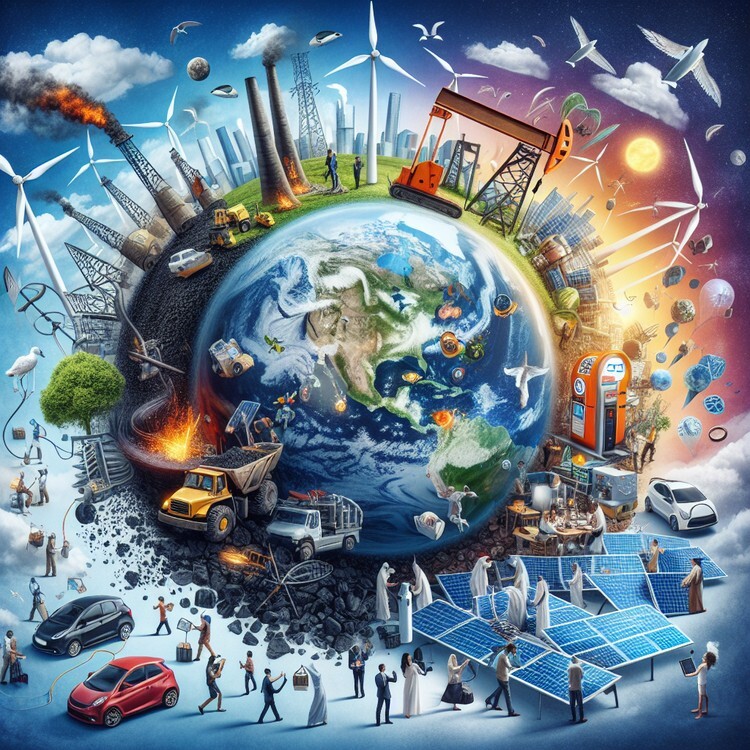The world is approaching a significant milestone in its use of fossil fuels. Experts predict that we are nearing ‘peak’ fossil fuels, meaning that global demand for coal, oil, and gas will start to decline. This is a remarkable achievement, but it also raises important questions about how quickly we can transition to a clean energy system and avoid further damage to the planet. The UN climate conference in Dubai is focused on addressing these challenges.
The International Energy Agency (IEA) forecasts that global fossil fuel use will peak in 2025, even without new climate policies. This is considered a historic turning point by the IEA Executive Director. However, transitioning away from fossil fuels will not be easy. Energy is not just another input in the global economy; it is the economy itself. We have become a fossil fuel society, relying on massive amounts of energy for steel production, cement manufacturing, and liquid fuels. The scale of our energy consumption is staggering.
For most of human history, we lived in poverty and drudgery. However, the industrial revolution, fueled by coal, oil, and gas, brought about explosive economic growth and improved living standards. Today, energy is central to everything we do. The challenge now is to switch to renewable energy sources. Wind and solar power have been growing rapidly, but they still only account for around 2% of global energy supply. The majority of our energy still comes from fossil fuels.
The key to reducing our reliance on fossil fuels lies in electrifying everything. Electric devices tend to be more efficient than those powered by fossil fuels, resulting in reduced energy demand. Renewable electricity is becoming cheaper than fossil fuels, which will save us money in the long run. Private investment, rather than government subsidies, should drive the transition to renewable energy. However, upfront costs remain a challenge, particularly for poorer countries. Efforts are being made to facilitate financing for renewables in these countries, which could unlock significant investment.
The transition to clean energy is happening worldwide and is unstoppable. However, the scale of the challenge is immense. We need to electrify everything for everyone on the planet within a couple of decades. This urgency explains why we have had 28 COP conferences and still haven’t solved the climate problem. It is crucial that we continue to work towards a sustainable future and accelerate the transition to renewable energy sources.
Original news source: Fossil fuels: Can humanity really kick its addiction? (BBC)
🎧 Listen:
Slow
Normal
Fast
📖 Vocabulary:
| 1 | milestone | A significant point in development or progress |
| 2 | transition | The process or a period of changing from one state or condition to another |
| 3 | decline | A gradual fall or reduction |
| 4 | achievement | A successful result gained by effort |
| 5 | consumption | The using up of a resource |
| 6 | staggering | So great, shocking, or surprising that it is difficult to believe |
| 7 | poverty | The state of being extremely poor |
| 8 | drudgery | Tedious, dull, and unrewarding work |
| 9 | explosive | Characterized by a sudden and large increase |
| 10 | reliance | Dependence on something or someone for support or existence |
| 11 | electrifying | Making something capable of running on electricity |
| 12 | efficient | Capable of producing desired results without wasting materials, time, or energy |
| 13 | subsidies | Financial assistance given by the government to support an industry or business |
| 14 | financing | The act of providing money for a project or enterprise |
| 15 | sustainable | Able to be maintained at a certain rate or level without harming the environment |
Group or Classroom Activities
Warm-up Activities:
– News Summary
Instructions:
1. Divide the class into pairs or small groups.
2. Give each group a copy of the article.
3. Ask each group to read the article and write a summary of the key points.
4. After a designated time, have each group share their summary with the class.
– Word Association
Instructions:
1. Write the words “fossil fuels” on the board.
2. Ask one student to say a word that is associated with “fossil fuels” (e.g. “coal”).
3. The next student must say a word associated with the previous word (e.g. “mining”).
4. Continue the game, with each student saying a word associated with the previous word.
5. If a student cannot think of a word or repeats a word, they are out.
6. The game continues until there is only one student left.
– Sketch It
Instructions:
1. Divide the class into pairs.
2. Give each pair a piece of paper and a pen or pencil.
3. Ask one student in each pair to describe a scene or concept related to the article (e.g. “a wind turbine”).
4. The other student must then draw what they think the scene or concept looks like based on the description.
5. After a designated time, have each pair share their drawing with the class.
– Headline Creation
Instructions:
1. Divide the class into small groups.
2. Ask each group to create a headline for an article about the transition to renewable energy.
3. Encourage students to be creative and catchy with their headlines.
4. After a designated time, have each group share their headline with the class.
5. Discuss the different headlines and why they are effective or not.
– Future Predictions
Instructions:
1. Ask each student to think about what the world will look like in 50 years in terms of energy use.
2. In pairs or small groups, have students discuss and write down their predictions.
3. After a designated time, have each group share their predictions with the class.
4. Discuss the different predictions and the reasons behind them.
🤔 Comprehension Questions:
1. What is the significance of reaching ‘peak’ fossil fuels?
2. How does the International Energy Agency predict global fossil fuel use will change in the coming years?
3. Why is transitioning away from fossil fuels challenging?
4. How has the industrial revolution impacted our reliance on fossil fuels?
5. What is the current percentage of global energy supply that comes from wind and solar power?
6. How can electrifying everything help reduce our reliance on fossil fuels?
7. What is the role of private investment in transitioning to renewable energy?
8. Why is financing for renewables a challenge for poorer countries?
Go to answers ⇩
🎧✍️ Listen and Fill in the Gaps:
The world is approaching a significant milestone in its use of fossil fuels. Experts predict that we are nearing ‘peak’ fossil fuels, meaning that global demand for coal, oil, and gas will start to (1)______. This is a remarkable (2)______, but it also raises important questions about how quickly we can transition to a (3)______ energy system and avoid further damage to the planet. The UN climate conference in Dubai is focused on addressing these challenges.
The International Energy Agency (IEA) (4)______ that global fossil fuel use will peak in 2025, even without new climate policies. This is considered a historic turning point by the IEA (5)______ Director. However, transitioning away from fossil fuels will not be easy. Energy is not just another input in the global economy; it is the economy itself. We have (6)______ a fossil fuel society, (7)______ on massive amounts of energy for steel production, cement manufacturing, and liquid fuels. The scale of our energy consumption is staggering.
For most of human history, we lived in poverty and drudgery. However, the industrial revolution, fueled by coal, oil, and gas, brought about explosive economic growth and improved living standards. Today, energy is central to everything we do. The (8)______ now is to switch to (9)______ energy sources. Wind and solar (10)______ have been growing rapidly, but they still only account for around 2% of global energy supply. The majority of our energy still comes from fossil (11)______.
The key to reducing our reliance on fossil fuels lies in electrifying everything. Electric devices tend to be more efficient than those powered by fossil fuels, resulting in reduced energy demand. Renewable electricity is becoming cheaper than fossil fuels, which will save us money in the long run. Private investment, rather than government subsidies, should (12)______ the transition to renewable energy. However, upfront costs (13)______ a challenge, particularly for poorer countries. Efforts are being made to (14)______ financing for renewables in these countries, which could unlock significant investment.
The transition to clean energy is happening worldwide and is unstoppable. However, the scale of the challenge is immense. We need to electrify everything for everyone on the planet within a couple of decades. This (15)______ explains why we have had 28 COP conferences and still haven’t solved the climate problem. It is crucial that we continue to work towards a (16)______ future and accelerate the transition to renewable energy sources.
Go to answers ⇩
💬 Discussion Questions:
Students can ask a partner these questions, or discuss them as a group.
1. What is your opinion on the prediction that global demand for fossil fuels will start to decline?
2. How would you feel if the world transitioned to a clean energy system quickly and avoided further damage to the planet?
3. Do you like the idea of relying more on renewable energy sources like wind and solar power? Why or why not?
4. Do you think it is possible for private investment to drive the transition to renewable energy, rather than government subsidies? Why or why not?
5. How do you think upfront costs for transitioning to renewable energy could be overcome, especially in poorer countries?
6. What is your opinion on the statement that the transition to clean energy is happening worldwide and is unstoppable?
7. How do you think electrifying everything could help reduce our reliance on fossil fuels?
8. Do you think renewable electricity becoming cheaper than fossil fuels will truly save us money in the long run? Why or why not?
9. How do you think efforts to facilitate financing for renewables in poorer countries could unlock significant investment?
10. What challenges do you think the world will face in electrifying everything for everyone on the planet within a couple of decades?
11. How do you feel about the fact that we have had 28 COP conferences and still haven’t solved the climate problem?
12. What do you think needs to be done in order to accelerate the transition to renewable energy sources?
13. How do you think a sustainable future can be achieved?
14. Do you think it is important for individuals to take action in their own lives to reduce reliance on fossil fuels? Why or why not?
15. How do you think the transition to clean energy will impact the global economy?
Individual Activities
📖💭 Vocabulary Meanings:
Match each word to its meaning.
Words:
1. milestone
2. transition
3. decline
4. achievement
5. consumption
6. staggering
7. poverty
8. drudgery
9. explosive
10. reliance
11. electrifying
12. efficient
13. subsidies
14. financing
15. sustainable
Meanings:
(A) Financial assistance given by the government to support an industry or business
(B) The using up of a resource
(C) A successful result gained by effort
(D) The process or a period of changing from one state or condition to another
(E) Characterized by a sudden and large increase
(F) The state of being extremely poor
(G) Dependence on something or someone for support or existence
(H) Able to be maintained at a certain rate or level without harming the environment
(I) A significant point in development or progress
(J) Capable of producing desired results without wasting materials, time, or energy
(K) Making something capable of running on electricity
(L) So great, shocking, or surprising that it is difficult to believe
(M) Tedious, dull, and unrewarding work
(N) A gradual fall or reduction
(O) The act of providing money for a project or enterprise
Go to answers ⇩
🔡 Multiple Choice Questions:
1. What is the significance of reaching ‘peak’ fossil fuels?
(a) Global demand for coal, oil, and gas will increase
(b) Global demand for coal, oil, and gas will remain the same
(c) Global demand for coal, oil, and gas will start to decline
(d) Global demand for coal, oil, and gas is unpredictable
2. When does the International Energy Agency (IEA) forecast that global fossil fuel use will peak?
(a) 2030
(b) 2040
(c) 2050
(d) 2025
3. What is the challenge in transitioning away from fossil fuels?
(a) Renewable energy sources are not readily available
(b) Renewable electricity is more expensive than fossil fuels
(c) Private investment is not driving the transition
(d) Energy is the economy itself
4. What percentage of global energy supply comes from wind and solar power?
(a) 10%
(b) 2%
(c) 25%
(d) 50%
5. What is the key to reducing reliance on fossil fuels?
(a) Electrifying everything
(b) Increasing government subsidies
(c) Decreasing energy demand
(d) Investing in coal, oil, and gas
6. What is becoming cheaper than fossil fuels?
(a) Steel production
(b) Renewable electricity
(c) Cement manufacturing
(d) Liquid fuels
7. What is a challenge for poorer countries in transitioning to renewable energy?
(a) Lack of available renewable energy sources
(b) Government subsidies
(c) Upfront costs
(d) Private investment
8. What is the urgency in transitioning to renewable energy sources?
(a) The scale of the challenge is immense
(b) Fossil fuels are running out
(c) The UN climate conference in Dubai is focused on it
(d) The majority of our energy comes from wind and solar power
Go to answers ⇩
🕵️ True or False Questions:
1. Transitioning away from fossil fuels will be easy, as energy is just another input in the global economy, not the economy itself.
2. The key to reducing reliance on fossil fuels lies in electrifying everything, as electric devices tend to be more efficient and renewable electricity is becoming cheaper than fossil fuels.
3. Wind and solar power currently only account for around 2% of global energy supply, with the majority still coming from fossil fuels.
4. The transition to clean energy is not happening worldwide and is stoppable, and the scale of the challenge is not immense and does not require urgent action.
5. Private investment, rather than government subsidies, should drive the transition to renewable energy, but upfront costs remain a challenge, particularly for poorer countries.
6. The UN climate conference in Dubai is not focused on addressing the challenges of transitioning to a clean energy system.
7. The International Energy Agency (IEA) forecasts that global fossil fuel use will peak in 2025, even without new climate policies.
8. Experts predict that global demand for coal, oil, and gas will not start to decline, marking a significant milestone in the use of fossil fuels.
Go to answers ⇩
📝 Write a Summary:
Write a summary of this news article in two sentences.
Check your writing now with the best free AI for English writing!
Writing Questions:
Answer the following questions. Write as much as you can for each answer.
Check your answers with our free English writing assistant!
1. According to the International Energy Agency, when is global fossil fuel use predicted to peak?
2. Why is transitioning away from fossil fuels considered a challenge?
3. What role does electrifying everything play in reducing reliance on fossil fuels?
4. What is the current percentage of global energy supply that comes from wind and solar power?
5. What is the main barrier to transitioning to renewable energy sources in poorer countries?
✅ Answers
🤔✅ Comprehension Question Answers:
1. What is the significance of reaching ‘peak’ fossil fuels?
The significance of reaching ‘peak’ fossil fuels is that it marks the point where global demand for coal, oil, and gas will start to decline.
2. How does the International Energy Agency predict global fossil fuel use will change in the coming years?
The International Energy Agency predicts that global fossil fuel use will peak in 2025, even without new climate policies.
3. Why is transitioning away from fossil fuels challenging?
Transitioning away from fossil fuels is challenging because energy is deeply embedded in the global economy and society. We rely on massive amounts of energy for various industries and daily activities.
4. How has the industrial revolution impacted our reliance on fossil fuels?
The industrial revolution, fueled by coal, oil, and gas, brought about explosive economic growth and improved living standards. As a result, we have become heavily reliant on fossil fuels for our energy needs.
5. What is the current percentage of global energy supply that comes from wind and solar power?
Wind and solar power currently account for around 2% of global energy supply.
6. How can electrifying everything help reduce our reliance on fossil fuels?
Electrifying everything can help reduce our reliance on fossil fuels because electric devices tend to be more efficient than those powered by fossil fuels, resulting in reduced energy demand.
7. What is the role of private investment in transitioning to renewable energy?
Private investment should drive the transition to renewable energy. It is believed that private investment, rather than government subsidies, will be the key driver in accelerating the adoption of renewable energy sources.
8. Why is financing for renewables a challenge for poorer countries?
Financing for renewables is a challenge for poorer countries because upfront costs for renewable energy infrastructure can be high. These countries may lack the financial resources to invest in renewable energy projects without external support or financing mechanisms.
Go back to questions ⇧
🎧✍️✅ Listen and Fill in the Gaps Answers:
(1) decline
(2) achievement
(3) clean
(4) forecasts
(5) Executive
(6) become
(7) relying
(8) challenge
(9) renewable
(10) power
(11) fuels
(12) drive
(13) remain
(14) facilitate
(15) urgency
(16) sustainable
Go back to questions ⇧
📖💭✅ Vocabulary Meanings Answers:
1. milestone
Answer: (I) A significant point in development or progress
2. transition
Answer: (D) The process or a period of changing from one state or condition to another
3. decline
Answer: (N) A gradual fall or reduction
4. achievement
Answer: (C) A successful result gained by effort
5. consumption
Answer: (B) The using up of a resource
6. staggering
Answer: (L) So great, shocking, or surprising that it is difficult to believe
7. poverty
Answer: (F) The state of being extremely poor
8. drudgery
Answer: (M) Tedious, dull, and unrewarding work
9. explosive
Answer: (E) Characterized by a sudden and large increase
10. reliance
Answer: (G) Dependence on something or someone for support or existence
11. electrifying
Answer: (K) Making something capable of running on electricity
12. efficient
Answer: (J) Capable of producing desired results without wasting materials, time, or energy
13. subsidies
Answer: (A) Financial assistance given by the government to support an industry or business
14. financing
Answer: (O) The act of providing money for a project or enterprise
15. sustainable
Answer: (H) Able to be maintained at a certain rate or level without harming the environment
Go back to questions ⇧
🔡✅ Multiple Choice Answers:
1. What is the significance of reaching ‘peak’ fossil fuels?
Answer: (c) Global demand for coal, oil, and gas will start to decline
2. When does the International Energy Agency (IEA) forecast that global fossil fuel use will peak?
Answer: (d) 2025
3. What is the challenge in transitioning away from fossil fuels?
Answer: (d) Energy is the economy itself
4. What percentage of global energy supply comes from wind and solar power?
Answer: (b) 2%
5. What is the key to reducing reliance on fossil fuels?
Answer: (a) Electrifying everything
6. What is becoming cheaper than fossil fuels?
Answer: (b) Renewable electricity
7. What is a challenge for poorer countries in transitioning to renewable energy?
Answer: (c) Upfront costs
8. What is the urgency in transitioning to renewable energy sources?
Answer: (a) The scale of the challenge is immense
Go back to questions ⇧
🕵️✅ True or False Answers:
1. Transitioning away from fossil fuels will be easy, as energy is just another input in the global economy, not the economy itself. (Answer: False)
2. The key to reducing reliance on fossil fuels lies in electrifying everything, as electric devices tend to be more efficient and renewable electricity is becoming cheaper than fossil fuels. (Answer: True)
3. Wind and solar power currently only account for around 2% of global energy supply, with the majority still coming from fossil fuels. (Answer: True)
4. The transition to clean energy is not happening worldwide and is stoppable, and the scale of the challenge is not immense and does not require urgent action. (Answer: False)
5. Private investment, rather than government subsidies, should drive the transition to renewable energy, but upfront costs remain a challenge, particularly for poorer countries. (Answer: True)
6. The UN climate conference in Dubai is not focused on addressing the challenges of transitioning to a clean energy system. (Answer: False)
7. The International Energy Agency (IEA) forecasts that global fossil fuel use will peak in 2025, even without new climate policies. (Answer: True)
8. Experts predict that global demand for coal, oil, and gas will not start to decline, marking a significant milestone in the use of fossil fuels. (Answer: False)
Go back to questions ⇧















